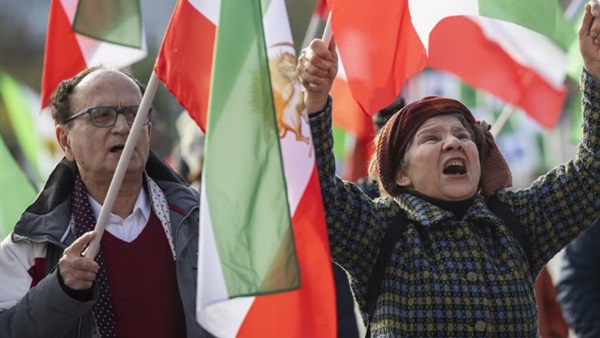Iran protests: UN council votes to investigate human rights abuses

The United Nations’ Human Rights Council launched an international investigation on Thursday into the ongoing violence by the Islamic regime in Tehran against a 10-week protest movement triggered by the death in custody of 22-year-old Mahsa Amini.
The vote came after a rare special session of the UN body devoted exclusively to the ongoing violence in Iran. A motion for a fact-finding mission into abuses against women and children, approved by a vote of 25-6, with 16 abstentions, was tabled by Germany and Iceland.
“It pains me to see what is happening in the country – images of children killed, of women being beaten in the streets,” said Volker Turk, UN high commissioner for human rights.
“The old methods and the fortress mentality of those who wield power simply don’t work. In fact, they only aggravate the situation. We are now in a full-fledged human rights crisis.”
At least 440 protesters have been killed over the course of protests in more than 150 towns and cities across Iran, according to Hrana, an Oslo-based rights group. Another 18,000 people have been arrested.
Iran’s protest movement, triggered by Amini’s death while in the custody of the morality police and led by women and youth, received international attention earlier this week after the players on Iran’s national football team refused to sing the national anthem at a match against England at the World Cup in Qatar.
On Thursday, regime enforcers reportedly arrested football star Voria Ghafouri, an ethnic Kurd, for speaking out on behalf of protesters. He has been charged with insulting the national football team and propagating against the regime, according to the semi-official Borna news.
Strikes and protests were also reported Thursday across the country, especially in the ethnic Kurdish districts of Iran’s west and northwest.
It remains unclear what effect, if any, the fact-finding mission will have on developments in Iran, where the regime is using weapons of war as well as mass arrests against a largely peaceful nationwide uprising against the authorities in Tehran.
But an investigation with the imprimatur of the UN could up the pressure against regime leaders and security forces, who may be accused of internationally recognised crimes against humanity, and perhaps hasten any possible defections or refusals to take part in the violence.
“Those perpetrating human rights violations and crimes under international law, from commanders to those who open fire on protestors on the street and commit torture, must know that evidence of their acts will be collected and preserved, with a view of future criminal proceedings,” Quinn McKew, executive director of the advocacy group Article 19, said in a statement.
In Geneva, Tehran dispatched Khadijeh Karimi, a deputy of Iran’s vice-president for women and family affairs, to make Iran’s case. She called the special session “politically motivated”.
“The Islamic Republic of Iran deeply regrets that the human rights council is abused once again by some arrogant states to antagonize a sovereign UN member state that is fully committed to its obligation to promote and protect human rights,” she said.
Another Tehran regime representative accused the West of repressing its own citizens.
“German, American, French and British women also deserve freedom from violence as well,” she said, calling the investigation “based on lies as a tool to achieve narrow goals by self-appointed human rights guardians.”
Iran’s backers, including Russia, China, Syria, North Korea, Venezuela, Belarus and other authoritarian states, argued that it was unfair for the council to single out Iran for its rights abuses, insisting that the goal of the body was to work with member states toward improvement rather than punishing alleged transgressions.
“All human rights must be treated in a fair and equal manner,” China’s envoy to the human rights council said. “National and regional specificity should be taken into account. The work of the human rights council must be truly conducive to the protection of human rights.”
But Western nations rejected the argument. They named female protesters killed in the violence, including 16-year-olds Sarina Esmailzadeh and Nika Shakarani. The US delegation received a gentle rebuke for holding the photos and names of those killed in the violence.
“No culture tolerates the killing of women and children,” said Michele Taylor, US envoy to the council.
Others, including erstwhile Iranian business partners such as Germany, South Korea and Japan, accused Iran of violating basic rights to freedom of assembly and expression as stipulated in international covenants to which Tehran is a signatory.
“On many occasions, we have called upon Iran to respect these rights, to stop the violent crackdown on protesters, the bloodshed, the arbitrary killing, the mass arrests, the death penalties,” said Anna Baerbock, Germany’s foreign minister. “The only answer we received was more violence, more deaths.”
Diplomats spoke out passionately against the regime crackdown, emphasising reports of violence against women and children. Iranian officials’ threats to impose the death penalty on protesters drew special scrutiny. Both Ukraine and Lithuania also raised the issue of Iran’s alleged sales of weapons to Russia now being used against Ukrainian civilians in Moscow’s ongoing war.
“This significant move towards accountability offers renewed hope to victims of the authorities’ bloody crackdown on protests,” said Mr McKew.
“By establishing an investigative accountability mechanism, the council has sent a clear and unequivocal message to the Iranian authorities that they cannot continue with their brutal assault on human life with impunity.”





